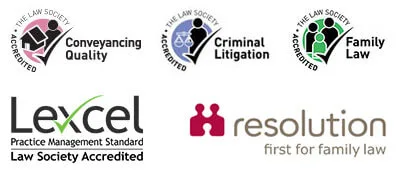Divorce lawyers & family solicitors services
A relationship breaking down can be extremely stressful and daunting. Therefore, the experience can be made less traumatic and acrimonious by instructing an exceptionally committed legal team to assist you. Our family law team at Darton Law will work towards reaching an agreement between parties by avoiding confrontation where possible, but still ensuring that our client’s best interests remain paramount. If it is necessary for matters to progress towards Court proceedings, our team will provide excellent representation in order to achieve the best results for you.
You will be provided with specialist family law advice in relation to what should happen to your finances, division of property and any matters concerning the children of the family. Our team will offer you the support you require as well as a high level of professionalism through this highly emotional time. We have developed a reputation for being approachable, friendly and for consistently exceeding our client’s expectations whilst maintaining ethical and socially responsible standards.
We provide expert family law form advice in the following areas:
- Divorce and separation law matter
- Financial Settlement for both spouses and children
- Cohabitation
- Civil partnership
- Children – Private Law ( disputes between family members)
- Children – Public Law ( disputes involving social services)
- International child disputes including Child Abduction and removal from the jurisdiction.
- Domestic Violence Law
We now are able to offer clients family legal aid. Family legal aid covers the following areas;
- Divorce and finances
- Private Children Act Proceedings
- Care and Adoption Proceedings
However, not everyone is eligible for legal aid. In order to be eligible you have to pass a means test (which is based on income) and a merits test. If you claim certain benefits the you will meet the means test. If you earn an income evidence will need to be provided for your application to considered by the Legal Aid Agency.
The merits test is usually met if it is in the interests of justice for legal aid to be granted and there is evidence of domestic violence, this can be through a criminal conviction at Court, a non-molestation order, a GP letter or letter from a refuge. Legal aid can also be granted in cases where people suffer from mental health issues. Again, evidence of this has to be provided.
If you are unsure as to whether you can apply for legal aid, then please contact Kate Maddison and she will be able to advise you accordingly.
You are welcome to contact our firm by e-mail or telephone to seek our specialist advice on Family Law & Children Law. We assure you that your matter will be dealt with in strict confidence.
Meet our Family Law Team
Family Law FAQ’s
This page is related to: family solicitor, family lawyers, family law, divorce solicitors
What do our clients say about us?
Used recently and couldn’t have been more pleased. Prompt, friendly and professional. All sorted and walked away feeling details explained and I could stop my worries.
As first time buyers, we had our Conveyancing done with Darton Law and I couldn’t have wished for a better service. We were completely clueless about the process but Anne, James and Darren kept us informed throughout, and took all the stress out of the experience. Many people told me how the “legal” part of house buying was the worst bit, however I couldn’t disagree more, everything went through seamlessly and we exchanged and completed exactly when we wanted to. Thanks to everyone in the team! Will definitely use Darton again in the future.
Thank you to all the team at Darton Law – you gave me my life back.
The service was very approachable and friendly. I was kept informed at every stage of the proceedings. Very impressed with the professional service of the partnership which lead to a very satisfactory outcome.
I was able to contact at any time and always given a response. I knew what happening with my case every step of the way. I was totally impressed with the whole service provided by Darren and his colleagues and he also took the time to explain things to my family. Myself and my family could not be happier – not a single bad thing to say.
It was made very easy for me to understand. I now understand the hard work and time which was put into preparing the defence for my case, it was brilliant.
Outstanding I was very happy with the firm.

